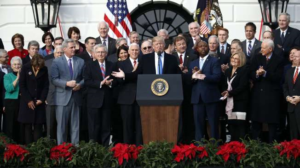Good government requires compromise.
Past presidents have known it. So have members of Congress — from both political parties. The rigid ideologues — either on the left or the right — might sleep well at night knowing that they hold firm to their principles. But the rest of us pay the price.
So it is with the current government shutdown that commenced at midnight Friday.
As I understand it, Democratic leaders in Congress have agreed to give Donald Trump money to build that wall he wants to erect on our southern border. They have demanded something in return: a commitment to avoiding the deportation of thousands of U.S. residents who came to this country as children when their parents brought them here illegally.
OK, then. Republicans get the wall; Democrats get to keep the Deferred Action on Childhood Arrivals rule.
Both sides give a little to the other.
Isn’t that how it works? Sure it is!
Meanwhile, the president who touts himself as a supreme deal-maker keeps changing his mind. He wants a deal to protect DACA recipients because he loves them. Then he feels the heat from the ideologues within his Republican Party who want to toss them out.
As for Democratic leaders, they, too are feeling the heat from their ideologues who want nothing to do with a wall.
I tend to favor the lefties on this one. However, I want the government to reopen fully. I also want compromise to rule the day. I want our elected leaders to do the job we sent them to Washington to do: I want them to govern effectively.
I do not believe in rigid ideology. I am now 68 years of age. The older I get the more room I seek to maneuver for the cause of good government.
Give a little. Declare victory. Open the doors to our government — for which we are paying good money!







